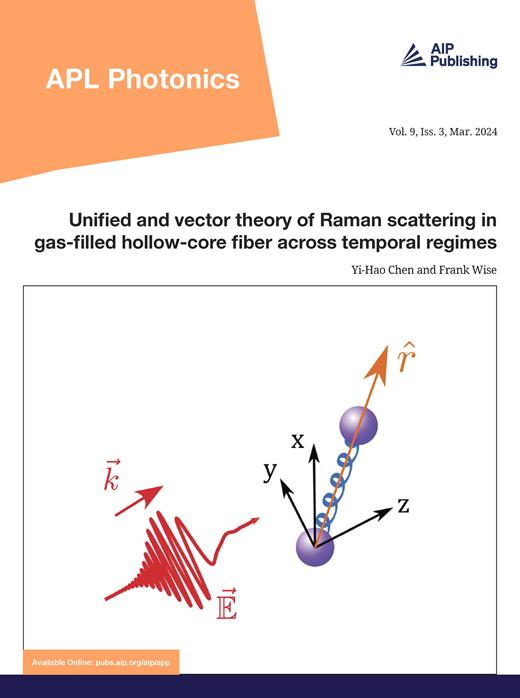Unveiling the origins of quasi-phase matching spectral imperfections in thin-film lithium niobate frequency doublers
IF 5.4
1区 物理与天体物理
Q1 OPTICS
引用次数: 0
Abstract
Thin-film lithium niobate (TFLN) based frequency doublers have widely been recognized as an essential component for both classical and quantum optical communications. Nonetheless, the efficiency (unit: %/W) of these devices is hindered by imperfections present in the quasi-phase matching (QPM) spectrum. In this report, we present a thorough experimental study of spectral imperfections in TFLN frequency doublers with varying lengths, ranging from 5 to 15 mm. A non-destructive diagnostic method based on scattered light imaging is proposed and employed to identify the waveguide sections and primary waveguide parameters contributing to the imperfections in the QPM spectrum. By applying this method, we obtain the evolution of the QPM spectrum along the waveguide’s length. Correlating this information with the measurements of the relevant geometric parameters along the waveguides suggests that the TFLN film thickness variation is the primary source for the measured spectral distortions. Furthermore, we numerically reproduce the QPM spectra with the mapped TFLN film thickness across the entire waveguiding regions. These findings align with and complement the simulation results from previous numerical studies, providing further evidence of the effectiveness of the developed diagnostic method. This comprehensive investigation offers valuable insights into the identification and mitigation of spectral imperfections in TFLN-based frequency doublers, paving the way for the realization of nonlinear optical devices with enhanced efficiency and improved spectral fidelity.揭示铌酸锂薄膜倍频器中准相位匹配光谱缺陷的根源
基于铌酸锂薄膜(TFLN)的倍频器已被广泛认为是经典和量子光通信的重要组成部分。然而,这些器件的效率(单位:%/W)受到准相位匹配(QPM)光谱中存在的缺陷的阻碍。在本报告中,我们对长度从 5 毫米到 15 毫米不等的 TFLN 倍频器的光谱缺陷进行了深入的实验研究。我们提出并采用了一种基于散射光成像的非破坏性诊断方法,以确定导致 QPM 频谱不完美的波导截面和主要波导参数。通过应用这种方法,我们获得了 QPM 频谱沿波导长度方向的演变。将这一信息与波导沿线相关几何参数的测量结果相联系,表明 TFLN 薄膜厚度变化是测量到的光谱畸变的主要来源。此外,我们还在数值上再现了 QPM 光谱与整个波导区域中映射的 TFLN 薄膜厚度。这些发现与之前数值研究的模拟结果相吻合,并对其进行了补充,进一步证明了所开发诊断方法的有效性。这项全面的调查为识别和缓解基于 TFLN 的倍频器中的光谱缺陷提供了宝贵的见解,为实现具有更高的效率和更佳的光谱保真度的非线性光学器件铺平了道路。
本文章由计算机程序翻译,如有差异,请以英文原文为准。
求助全文
约1分钟内获得全文
求助全文
来源期刊

APL Photonics
Physics and Astronomy-Atomic and Molecular Physics, and Optics
CiteScore
10.30
自引率
3.60%
发文量
107
审稿时长
19 weeks
期刊介绍:
APL Photonics is the new dedicated home for open access multidisciplinary research from and for the photonics community. The journal publishes fundamental and applied results that significantly advance the knowledge in photonics across physics, chemistry, biology and materials science.
 求助内容:
求助内容: 应助结果提醒方式:
应助结果提醒方式:


